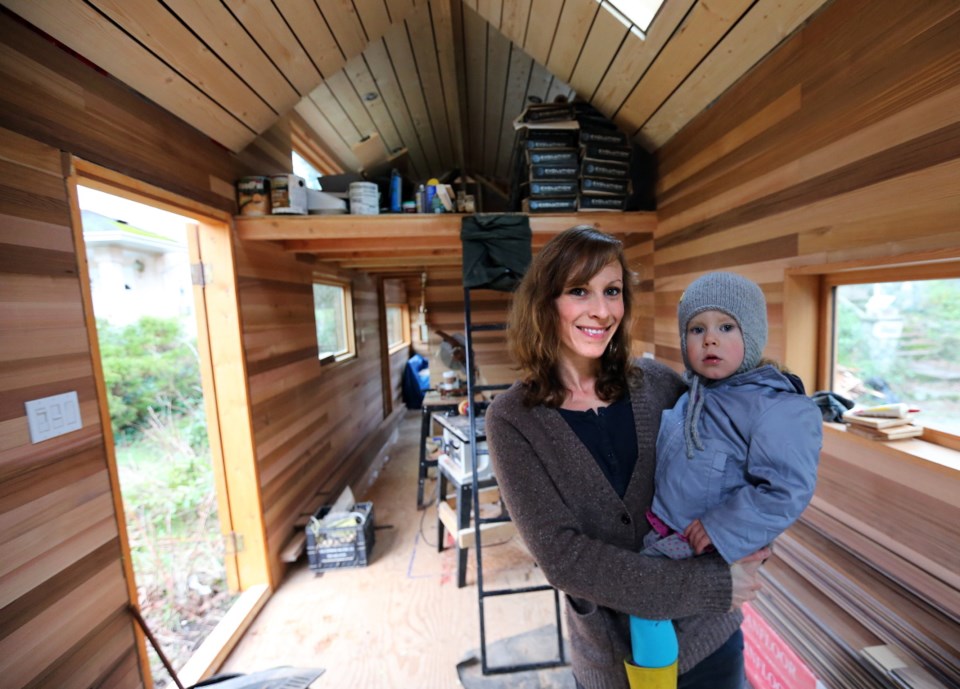Victoria’s Lukow family is on the hunt for the right spot to put a 350-square-foot home they are building themselves.
“Ideally, we’d like to be somewhere we can still commute to town by bike and remain a single-vehicle family,” said Jocelyn Lukow, 32. Her husband Jarvis, 35, is a web developer who works downtown. They have a two-year-old daughter. “The whole point is to simplify our lives.”
The young family was inspired by a growing trend in tiny homes, especially in a region where housing affordability is one of the worst in the country.
Tiny houses are frequently custom-built homes of 400 square feet or less on a moveable platform, and incorporate recycled materials and environmental design.
About a year ago, the Lukows decided to investigate low-cost, sustainable housing after paying down about $90,000 in student loans through frugality.
“We thought it would be torturous, but it was actually a lot fun,” said Lukow, a registered nurse. “We used to be more casual with our money, but after cutting back on everything, spending on something felt like a real treat.”
The Lukows rented in Victoria for more than a decade while they attended college and university and worked. As they began to plan for their family, they compared the costs of renting to owning.
“We decided not to buy in Victoria. But having our daughter, I started to feel that I wanted to give her a sense of home. I wanted her to have vivid memories of her childhood home,” Lukow said.
Last April, the couple bought a partially constructed tiny house on a trailer. Over the past year, they have worked on it weekends and nights. They expect to finish this spring.
“We’re trying to use as many reclaimed materials as we can,” said Lukow, noting her favourite feature of the home is the recycled barn wood on the exterior. They scour blogs for ideas and have found appliances and materials online.
The home will have 13-foot ceilings, a sleeping loft, a room for their daughter, a deep Japanese-style tub and a composting toilet. It will function off a simple water hookup and plug in.
“It has a lot of character,” said Lukow, who estimates they’ll spend about $30,000 in total on the home. They are hoping to lease space on a semi-rural lot somewhere near Victoria. So far, they have received lots of offers from landowners in rural areas, but nowhere close enough to town for them to commute.
“Our hope is the right place will come along,” Lukow said.
Because tiny homes are a relatively new trend, regulations around building and parking them vary and can be a grey area — especially in urban centres. Some mobile home parks will accommodate them if they have the appropriate dimensions and plumbing.
Detached suites and secondary homes are allowed in some parts of Sooke, Colwood and Langford. Saanich allows for secondary homes on some farmland. Last year, the district expanded its garden suite bylaws and decided to look at detached suites in the future.
“As part of that process, it was determined that consideration for secondary suites in accessory buildings [granny flats and carriage houses] would require further study through an extensive public process,” said senior planner Neil Findlow.
“Such a study is not a high priority at this time and is not currently in the planning department’s work program.”
However, several municipalities have made garden suites more accessible as residents look for mortgage helpers and planners look to create more density.
The recent international survey by the American think-tank Demographia noted the least-affordable cities — Victoria ranked second in Canada — all had in common a combination of high land costs with density-restrictive land-use regulations.
Dana Hummel is hoping to see the regulations change with the times. The Youbou builder has recently started the business Tiny Mountain Homes.
“I want to be able to supply people with an [economical] place to live,” said Hummel, who also hopes to use recycled materials.
Hummel is in the process of building his first tiny home to show potential clients. He also sells plans through his website, tinymountainhomes.com.



